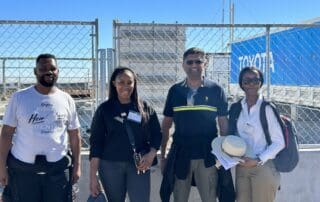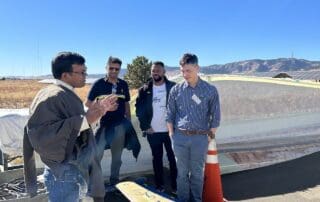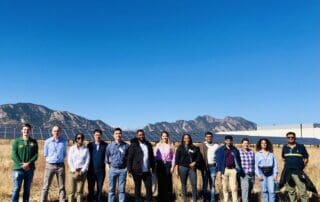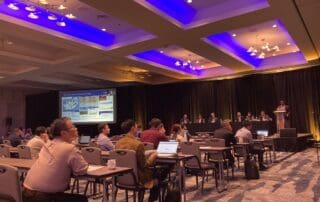This newsletter highlights recent projects, partnerships, and resources from the Global Power System Transformation (G-PST) Consortium. In this edition, read up on the outcomes from our Future of Inertia summit, access a new course about multicarrier energy systems, and much more!
Featured Video
In celebration of Women’s History Month, hear from the 2023 Women in Power System Transformation interns and fellows about how participating in this initiative not only helped them to develop new skills, but inspired them to lift their voices and be catalysts for change.
Featured News
Future of Inertia Summit Explores Inertia’s Role in Monitoring Power System Stability
Many of today’s power systems rely on inertia, or the natural response of generators synchronized to the system frequency to stay in motion, to correct frequency deviation during power system imbalance events. As grid systems evolve, their increasing levels of inverter-based resources, such as wind, solar, and battery storage, do not inherently provide inertia, but can provide different (sometimes faster or better) kinds of frequency responses. For this reason, system operators transitioning their power systems to renewable energy generation sources are exploring solutions to the reduction of generation synchronized to grid frequency, or the reduction of inertia, so their system can remain stable in the first seconds after an imbalance event.
G-PST hosted a virtual summit focused on addressing inertia’s role in maintaining power system frequency. Over 80 attendees, including representatives from 10 power system operators, joined the two-day event to offer insight into what research and analysis questions should be prioritized to better understand the opportunities and challenges presented by inertia’s evolving role in managing system stability. The summit served as a forum to share experiences, ask questions, and explore how G-PST can best support system operators as they navigate this evolution and consider what frequency metrics may exist beyond inertia.
Explore presentations and outcomes from G-PST’s Future of Inertia summit.
G-PST’s Pillar 2 lead, Lina Ramirez, further explored inertia’s role in power system transformation in her recent LinkedIn blog.
Control Room of the Future Assessment for Sulawesi Power System in Indonesia
Control rooms are a key element of electricity network operation. While the look and feel of the control rooms has maintained some consistency throughout history, the visualization technology and computer processing power has evolved steadily to manage the increasing complexity of the underlying power system. Maintaining reliability, security, and resilience in the face of this evolution requires agile adaptation of processes and advanced analytical capability that will be essential for system operators navigating their transition to a clean energy future.
In Indonesia, the Sulawesi power system, operated by Indonesia’s state electricity provider, PT Perusahaan Listrik Negara (PLN), will soon undergo rapid change with pending near-term upgrades and expansion that will introduce new challenges and opportunities. To manage these changes, PLN worked with G-PST on a road map for the possible implementation of a best-in-class structure and related functional capabilities for the Sulawesi Control Center. The report covers all aspects of control center functionality, from monitored data and analysis needs to facility design considerations. It is intended to be used by PLN to support decision-making about both near- and longer-term engineering design, as well as strategic and procurement planning. It is not intended to be an implementation plan or course of action for PLN to follow, but a means of considering optimal approaches for meeting the demands of the future power system.
This control center of the future road map was developed through G-PST’s Pillar 2, led by the U.S. National Renewable Energy Laboratory (NREL) in partnership with the Electric Power Research Institute (EPRI). The road map development process was created by EPRI, and serves as a framework for similar approaches for power system operations around the world. PLN staff provided extensive support in data-gathering as well as details and insights regarding power system operations in Sulawesi.
Explore all G-PST’s control center design resources.
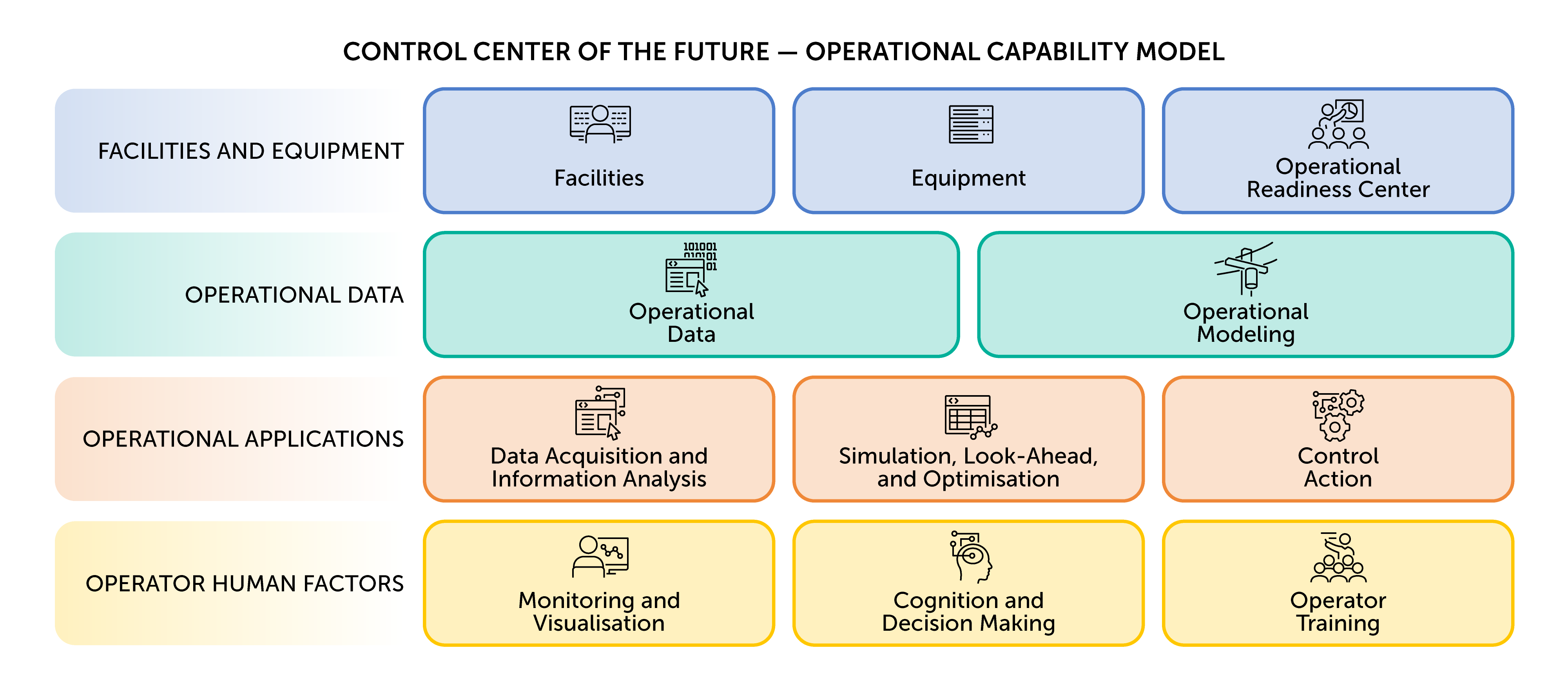
Framework for the control center of the future, showing the 11 color-coded operational capabilities within the four core blocks. Source: EPRI; Illustration by Chris Schwing, NREL.
Women in Power System Transformation Releases Multicarrier Energy Systems Course
With support from the Women in Power System Transformation program, a university-level technical course about “Multicarrier Energy Systems”, led by Dr. Madeleine McPherson, is now available. Multicarrier energy systems are characterized by coordination in operations and planning across multiple energy vectors and/or sectors to deliver reliable, cost-effective energy services to consumers with minimal impact on the environment.
This course explores the emergence and role of multicarrier energy systems in the energy transition and aims to instill a holistic perspective on the highly interconnected nature of energy challenges and the shift towards net zero. It explores key themes of decarbonization and electrification, delves into modeling techniques, and concludes by assessing existing tools and paradigm shifts in energy systems modeling. It also includes practical exercises using the Scenario Explorer model for a deeper understanding.
Materials for this and other course topics are available to anyone at no cost. They consist of approximately 3-5 hours of recorded lectures, supporting lecture slides, and student exercises and assessments. Lecture recordings and supporting materials are designed to be easily adopted into existing curriculum for instruction in a virtual or hybrid classroom format to supplement an existing module with an additional topic. They can also be used for practitioner-level technical training programs or self-upskilling.
Access the new course materials.
System Operator Staff from South Africa, India, and Vietnam Join Technical Exchange
G-PST hosted a second technical exchange in October 2023 with participation from four Eskom staff based in South Africa, two Grid India staff from the Southern Region Load Dispatch Center, and two National Load Dispatch Centre staff from Vietnam. The ten-day exchange began at the NREL campus in Golden, Colorado, then the visiting staff traveled to San Diego, California to take part in the Energy Systems Integration Group’s fall technical workshop.
The exchange included discussions about power systems research, resource adequacy studies, strategies for real-time forecasting, inertia estimation, tool tutorials, and more. The visiting staff participated in a “Lunch and Learn” where they shared experiences as well as unique challenges and contexts for integrating renewable energy and managing power systems in South Africa, India, and Vietnam. The exchange provided ample opportunity for both the visiting staff and members of the G-PST team to learn from each other by sharing their experiences in supporting advancements within their countries’ power systems.
“I would recommend any engineer work with G-PST. G-PST helps you grow technically and socially. It is about learning and getting better, contributing to our system operator and our society. It is a sisterhood and brotherhood of system operators.” – Dudu Hadebe, Grid Planning Specialist, Eskom, South Africa; G-PST Technical Exchange Participant.
Launch of the Electric Power Innovation for a Carbon-free Society Center
Led by Johns Hopkins University and in collaboration with academics and global industry and policy stakeholders from G-PST, the Energy Systems Integration Group, and Future Power Markets Forum, the Electric Power Innovation for a Carbon-free Society (EPICS) Center will enable a 100% emissions-free power grid by developing computing, economic, engineering, and policy methods and tools. Through strategic partnerships, EPICS will focus on advancing progress on G-PST’s Research Agenda via targeted work in four research areas:
- Harness the latest advances in computer technology to enable decision-making tools to handle the unpredictable nature of renewable energy resources like wind and solar;
- Find ways to accommodate wind, solar, and storage resources into the grid, which requires learning how to operate large numbers of inverters that connect these resources and the grid;
- Develop economic analysis principles tailored for making decisions about how to design and then reliably operate 100% renewable power grids;
- Use insights from the above efforts to develop strategies for achieving net-zero power grids globally, and use them to reduce and eventually eliminate carbon emissions from other economic sectors, including transportation and buildings.
Learn more about the EPICS Center.
Harnessing Artificial Intelligence for Energy System Decarbonization – Workshop Insights
The International Centre for Mathematical Sciences (ICMS) in Edinburgh hosted a workshop exploring the role artificial intelligence (AI) could play in helping manage low-emission energy systems. This workshop took place as part of the ICMS Knowledge Exchange Catalyst scheme, supporting Chris Dent of the University of Edinburgh’s School of Mathematics to work with G-PST. Travel for some of U.S. participants was supported by the U.K. Government’s Science and Innovation Network, as a means of enabling strong U.S. participation.
System operator staff from across seven countries joined the workshop, as well as contractors, national laboratories, and university researchers, all with a goal of scoping artificial intelligence solutions to questions laid out in G-PST’s Research Agenda. The workshop adopted a broad view of AI to focus on finding practical solutions for industry challenges while remaining open to new technologies. Proposals for future G-PST research were outlined in four areas: integrated resource planning, network topology optimization, forecasting for operations, and managing high levels of inverter-based resources. The first two areas were identified as opportunities for new G-PST projects, and the outcomes will inform the upcoming G-PST Research Agenda workshop in June.
The workshop organizers will reach out to system operators to explore their interests in these areas and share more detailed plans for projects and international collaborations.
For specific information, please contact Chris Dent at chris.dent@ed.ac.uk.
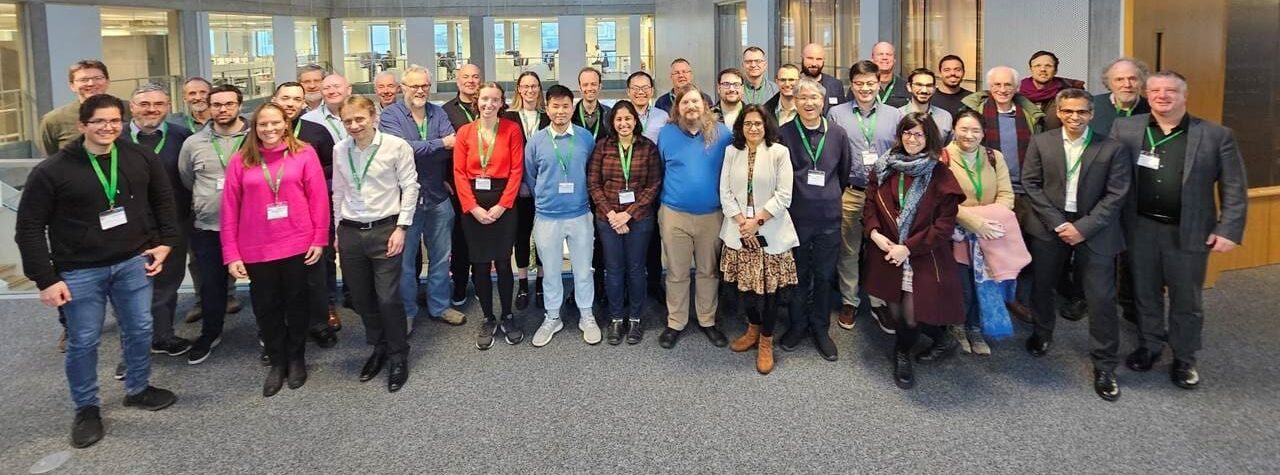
ICMS workshop participants
Advancing Renewable Energy Integration in Colombia
Together with Colombia’s power system operator, XM, and the Energy and Gas Regulatory Commission (CREG), Barbara O’Neill from NREL presented at a workshop exploring regulatory practices for integrating renewable energy into Colombia’s power system. A key outcome from this workshop was the decision by CREG and XM to establish working groups aimed at accelerating progress in power system decarbonization. This collaborative effort enhances Colombia’s capacity to develop the necessary regulatory frameworks and technical standards for a successful energy transition.
Learn more about XM’s decarbonization goals by reading our 2022 Q&A with XM’s Chief Executive Office, Maria Nohemi Arboleda Arango.
Establishing an Independent System Operator Workshop Series for Southern African Partners
In Southern Africa, there is a regional market and broader restructuring taking place. Many countries are considering a transition to independent system operators (ISOs). G-PST’s Southern African Community of Practice workstream is supporting countries in their transition to a regional market and potentially to independent system operators. Across four installments, the workshop series shed light on the evolution of ISOs in the United States, explored the design of power markets, delved into the intricacies of long-term, medium-term, and short-term planning processes, and covered legal and regulatory frameworks for an ISO.
Providing guidance on institutional design and governance in the Southern African region is important because several vertically integrated system operators are seeking a robust path to the development of an independent system operator and a market system, so this series enables the development of a strong peer network for supporting this process, in addition to resources and training materials that others can use after this series of events concludes.
Explore the workshops:
Events and Resources
In case you missed any, access G-PST’s recent webinars.
GFM Technology Implementation Council – Status and Outlook
Featured Speaker: Sten Arendt Stoltze, Senior Vice President – Engineering EPCO & IT, Ørsted
Advances in the Use of Wind and Solar Forecasting
Featured Speaker: Amber Motley, Director, Short Term Forecasting, California ISO
European Experience with “Connect and Manage”
Featured Speaker: Mark Norton, Vice President of Business Development, Smart Wires
Developing an EMT Study and Analysis Environment for a 100% Inverter Based Power System
Featured Speaker: Jun Bum Kwon, Senior Engineer, Energinet
Imbalance Reserve Product to Manage Uncertainty Between Day-Ahead and Real-Time Markets
Featured Speaker: James Friedrich, Lead Policy Developer, California ISO
Advances in the Use of Probabilistic Resource Adequacy Methods
Featured Speaker: Aidan Tuohy, Director, Transmission Operations and Planning, EPRI
Evaluating Major Contingencies and Conditions with the Potential to Cause Power System Disruptions
Featured Speakers: Luke Robinson, Group Manager – Modelling & Engineering, AEMO & Daniel Fracalossi, Senior Engineer – Grid Performance & Integration, AEMO

